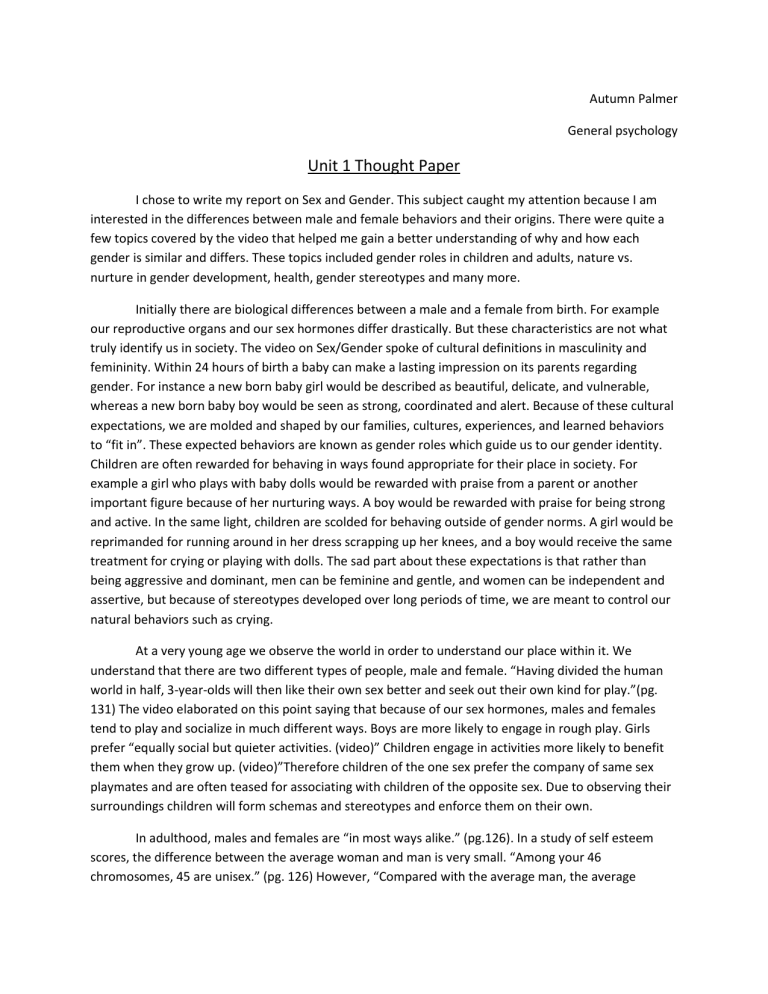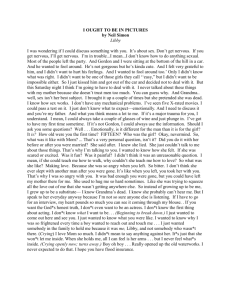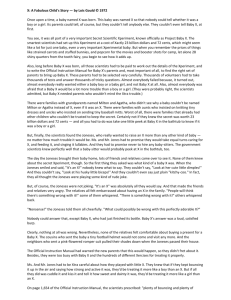Psychology Thought Paper (signature)

Autumn Palmer
General psychology
Unit 1 Thought Paper
I chose to write my report on Sex and Gender. This subject caught my attention because I am interested in the differences between male and female behaviors and their origins. There were quite a few topics covered by the video that helped me gain a better understanding of why and how each gender is similar and differs. These topics included gender roles in children and adults, nature vs. nurture in gender development, health, gender stereotypes and many more.
Initially there are biological differences between a male and a female from birth. For example our reproductive organs and our sex hormones differ drastically. But these characteristics are not what truly identify us in society. The video on Sex/Gender spoke of cultural definitions in masculinity and femininity. Within 24 hours of birth a baby can make a lasting impression on its parents regarding gender. For instance a new born baby girl would be described as beautiful, delicate, and vulnerable, whereas a new born baby boy would be seen as strong, coordinated and alert. Because of these cultural expectations, we are molded and shaped by our families, cultures, experiences, and learned behaviors to “fit in”. These expected behaviors are known as gender roles which guide us to our gender identity.
Children are often rewarded for behaving in ways found appropriate for their place in society. For example a girl who plays with baby dolls would be rewarded with praise from a parent or another important figure because of her nurturing ways. A boy would be rewarded with praise for being strong and active. In the same light, children are scolded for behaving outside of gender norms. A girl would be reprimanded for running around in her dress scrapping up her knees, and a boy would receive the same treatment for crying or playing with dolls. The sad part about these expectations is that rather than being aggressive and dominant, men can be feminine and gentle, and women can be independent and assertive, but because of stereotypes developed over long periods of time, we are meant to control our natural behaviors such as crying.
At a very young age we observe the world in order to understand our place within it. We understand that there are two different types of people, male and female. “Having divided the human world in half, 3-year-olds will then like their own sex better and seek out their own kind for play.”(pg.
131) The video elaborated on this point saying that because of our sex hormones, males and females tend to play and socialize in much different ways. Boys are more likely to engage in rough play. Girls prefer “equally social but quieter activities. (video)” Children engage in activities more likely to benefit them when they grow up. (video)”Therefore children of the one sex prefer the company of same sex playmates and are often teased for associating with children of the opposite sex. Due to observing their surroundings children will form schemas and stereotypes and enforce them on their own.
In adulthood, males and females are “in most ways alike.” (pg.126). In a study of self esteem scores, the difference between the average woman and man is very small. “Among your 46 chromosomes, 45 are unisex.” (pg. 126) However, “Compared with the average man, the average
woman enters puberty two years sooner, lives five years longer, carries 70 percent more fat, has 40 percent less muscle, and is 5 inches shorter.” (pg. 127) I found that the video didn’t address much about sexual tendencies and differences. The book however, said that “Women can become sexually aroused immediately after orgasm.” (pg. 127) Women can “smell fainter odors, express emotions more freely…are doubly vulnerable to depression and anxiety…and their risk of developing eating disorders is
10 times greater.” The video went on to say that there are constraints put on women’s intellectual development by society and self. Also we tend to suffer more poverty from single parenthood.
Both the text book and the video addressed the drastic differences in health. It is commonly believed that men are stronger and healthier than women. The book proved this to be false: “men are four times more likely to commit suicide or suffer alcohol dependence. They are far more often diagnosed with autism, color-blindness, attention deficit hyperactivity disorder (as children), and antisocial personality disorder (as adults).” (pg. 127) The video also touched on this saying that men are more vulnerable in all aspects of life. They are more likely to die from heart disease, lung cancer, accidents, suicide and homicide. From personal experience, I’ve noticed that men who seem angry more often than is usual tend to live less fulfilling and shorter lives. I believe that men may commit suicide more because they use methods which guarantee death whereas women may attempt to overdose which is more of a cry for help. The fact that men are more commonly involved in homicides is most likely related to the learned behavior of aggression.
There is also the misconception that men are better athletes than women. This really caught my interest because I am very athletic and competitive. Men are always so sure that they can jump higher, run faster, hit harder, lift more or otherwise out last a woman. The video proved this wrong as well. “Women can compete athletically. They may not beat the best male competetor, but they could easily beat everyone else. Top msle runners are only 10% faster than top female runners. The difference is getting smaller as expectations get higher for women.(video)”
A great example of a learned behavior which I’ve witnessed first hand is the idea that men don’t cry. Men perceive crying as weakness. Parents teach their sons that crying is for girls. I find this sad because in my opinion men are distancing themselves from their natural state to the point that when an appropriate time to cry comes, they are either incapable or too ashamed. Women on the other hand are taught from childhood that crying is acceptable and sometimes beneficial as part of the socialization process. Due to the different sex hormones developed early in life, we later behave differently because of different experiences. We observe our social/cultural environment for gender images such as how to dress and behave according to our gender. A great example that the video made of what a child perceives is that their father is usually coaching the sports team and the mother is on the sidelines cheering. This demonstrates why a girl may be convinced that her place is in the kitchen, in the background, or in the house taking care of children and a boy may be more adventurous, curious and exploratory. From a young age, females lives are more structured, supervised, and protected from experience. We are encouraged to stay close to home and help out with household chores. Boys however, invent, discover, and actively understand the world. “He enters the world with the premise that he can make a difference in the world.(video)” This leads to men taking charge and women falling back and allowing their lives to be dictated by their husbands.
In a more social light, men have a more extensive group of friends but they tend to be less intimate than friendships between women. Even young girls have more intense and important friendships. As a result of this and the fact that men invest more time into work, they end up with few or no friends at all. Positive aspects of being a man: “freedom to leave home for work, take risks, explore, challenge…” But on a more negative note, ‘men form identity tied to success or career and not feelings of personal satisfaction or a sense of belonging to a community or tightknit family. Many successful men have no close friends. (video)”
An important question remains: How much do social and cultural influences affect our gender identity. In short, Nature vs. Nurture. In most societies men are dominant. Females focus more on making connections and being interdependent than on having power and status. But are these traits we are born with? I believe so, but I also believe that these traits are exaggerated by society influencing us to follow ALL norms rather than doing what suits us best. If more people viewed each genders natural traits as beneficial and equally important, then more women would have important, high-paying careers.
Over time women have been discouraged from taking roles of power because we tend to have a more democratic view. We are more welcoming and anti-war and men are directive and autocratic. This can be observed in children. Boy’s speech is more forceful and direct. They are more likely to tell someone what to do than to ask politely. Girls on the other hand are more persuasive and patient. Both of these qualities are useful in different circumstances. So why is this “a mans world”? I believe it’s because regardless of how much women fight for their rights to be equal, men will always view themselves as better due to tradition, and their natural desire to dominate. Society is making progress in this area though.
Rather than dwelling on the differences that men and women have, I have learned from this assignment to notice all of the things we have in common. Because of my new understanding of the origins of these differences, I find it hard to stereotype men so harshly. It is unfair to judge someone for what they are raised to believe is acceptable. As a woman, I am criticized for fitting into my gender role even though that is what I’m encouraged to do my entire life. On the flip side I am also criticized when I step outside of the lines and live more freely. For example, I made the personal choice to cut my hair and I received some mixed reviews. I understand now that there are elementary distinctions we make as children that men have short hair and women have long hair. Even though I miss my hair, I am glad that I cut it because it challenges the role that I am expected to play. There is nothing wrong with an independent woman and there is nothing wrong with a sensitive man. Maybe if people were more open to being themselves rather than whom they are told to be, there would be less spousal issues, and more female leaders in the world. “How we think males and females differ has more of an impact than how much they actually do.(video)”








